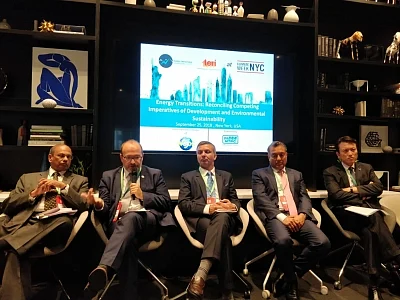New York, Sep 26 (IANS) Conditions have to be created for the infusion of capital needed to accelerate the transition to renewable sources of energy, according to a panel of experts.
Ajay Mathur, the Director General of TERI and Co-Chair of the Energy Transitions Commission (ETC) who chaired the panel on Tuesday, said: "You need private capital as well as public capital and public capital needs to be more risk-taking, while risks have to be reduced for private capital."
At the same time, the costs have to remain low enough for power to be affordable yet ensure that returns that can attract investors, he added.
The panel, Energy Transitions: Reconciling Competing Imperatives of Development and Environmental Sustainability, was one of the events on the sidelines of UN High-Level General Assembly Session.
One of India's advantages is that with its rapid pace of development, more than half of what it needs by 2030 is yet to be built. This means that they can be done in a sustainable manner to balance the imperatives of both development and climate change, he said.
Mathur said that a shift to renewable energy was essential for this and "India targets 175 GW of renewable capacity by 2022 (or 20%-22% of generation) and 265 GW by 2027."
Rachel Kyte, the Special Representative of the UN Secretary-General for Sustainable Energy for All, said in her keynote address that there was no longer a dualistic view that looked at development and environment in opposition to each other.
Individuals should be at the centre - they want clean air, safe medicine, healthy food and these were the priorities - and India was moving the right direction, she said.
Remy Rioux, the CEO of Agence Franaise de Developement (AFD), said the private sector had to work with development banks to generate adequate capital.
Development and climate action cannot rely entirely on foreign aid and other alternatives for financing for the UN Sustainable Development Goals and climate action have to be created, he said.
Woochong Um, the Director General of the Asian Development Bank's Sustainable Development and Climate Change Department, said that it was increasing the financing of climate action-related projects and by 2020 it will allocate $6 billion or 30 percent of its outlay for the sector.
To make power investments attractive to risk-averse bankers, the ADB was focusing on developing at planning stages of projects concepts to reduce risks, he said.
Sumant Sinha, Chairman and CEO of ReNew Power, said that despite its great potential, capital was not flowing at the moment to the sector to the extent needed.
One of the problems to scaling up renewable energy production was that power tariffs were reduced each time there was an increase in production, which in turn inhibits investments to increase capacity, Sinha said.
If there was a certainty in the tariffs and they held steady, there would be a much larger increase in renewable power generation capacity, he added.
Mohit Bhargava, the Head of Corporate Planning at NTPC Ltd, said that electricity had to be looked at as an one-stop solution to climate change, with transportation, agriculture and even cooking switching from fossil fuels to renewables.
About 30 percent of vehicles were expected to run on electricity by 2030 and gradually electric stoves will replace the gas cookers, he said.
The cost of renewable energy from sources like solar have come down drastically to about Rs 2.50, which is lower than the marginal cost of coal-generated electricity, he said.
As a result by 2030, about 40 to 45 percent of electricity will come from renewables, with the share of thermals going down proportionately, he said.
Bhargava said that coal was, however, not going to disappear because, among other reasons, solar energy was not available during the peak use hours at night and electricity storage technologies will have to become economical for that.
--IANS
al/mr
(This story was auto-published from a syndicated feed. No part of the story has been edited by The Quint.)
